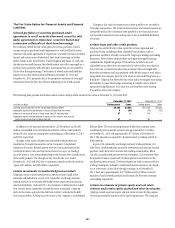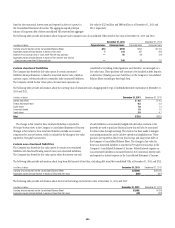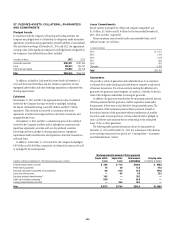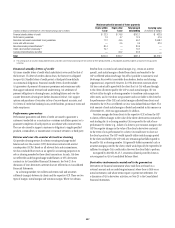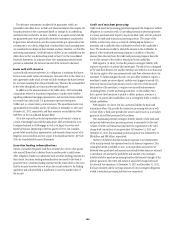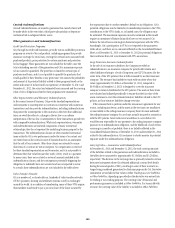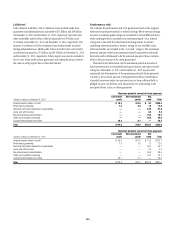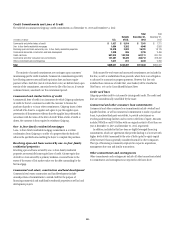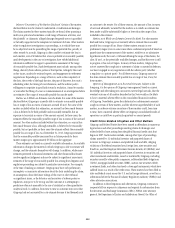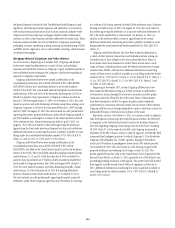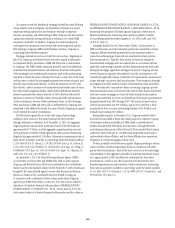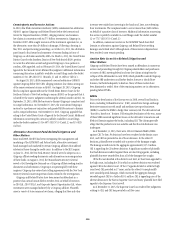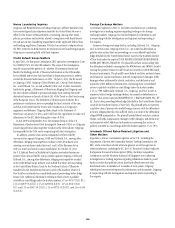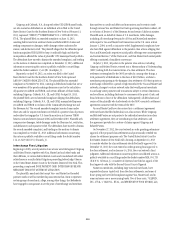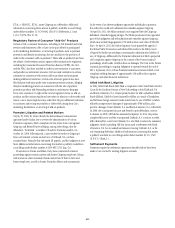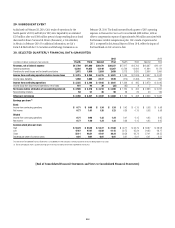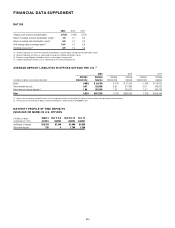Citibank 2013 Annual Report Download - page 321
Download and view the complete annual report
Please find page 321 of the 2013 Citibank annual report below. You can navigate through the pages in the report by either clicking on the pages listed below, or by using the keyword search tool below to find specific information within the annual report.303
Inherent Uncertainty of the Matters Disclosed. Certain of the matters
disclosed below involve claims for substantial or indeterminate damages.
The claims asserted in these matters typically are broad, often spanning a
multi-year period and sometimes a wide range of business activities, and
the plaintiffs’ or claimants’ alleged damages frequently are not quantified
or factually supported in the complaint or statement of claim. Other matters
relate to regulatory investigations or proceedings, as to which there may
be no objective basis for quantifying the range of potential fine, penalty, or
other remedy. As a result, Citigroup is often unable to estimate the loss in
such matters, even if it believes that a loss is probable or reasonably possible,
until developments in the case or investigation have yielded additional
information sufficient to support a quantitative assessment of the range
of reasonably possible loss. Such developments may include, among other
things, discovery from adverse parties or third parties, rulings by the court
on key issues, analysis by retained experts, and engagement in settlement
negotiations. Depending on a range of factors, such as the complexity of
the facts, the novelty of the legal theories, the pace of discovery, the court’s
scheduling order, the timing of court decisions, and the adverse party’s
willingness to negotiate in good faith toward a resolution, it may be months
or years after the filing of a case or commencement of an investigation before
an estimate of the range of reasonably possible loss can be made.
Matters as to Which an Estimate Can Be Made. For some of the matters
disclosed below, Citigroup is currently able to estimate a reasonably possible
loss or range of loss in excess of amounts accrued (if any). For some of the
matters included within this estimation, an accrual has been made because
a loss is believed to be both probable and reasonably estimable, but an
exposure to loss exists in excess of the amount accrued. In these cases, the
estimate reflects the reasonably possible range of loss in excess of the accrued
amount. For other matters included within this estimation, no accrual has
been made because a loss, although estimable, is believed to be reasonably
possible, but not probable; in these cases the estimate reflects the reasonably
possible loss or range of loss. As of December 31, 2013, Citigroup estimates
that the reasonably possible unaccrued loss in future periods for these
matters ranges up to approximately $5 billion in the aggregate.
These estimates are based on currently available information. As available
information changes, the matters for which Citigroup is able to estimate will
change, and the estimates themselves will change. In addition, while many
estimates presented in financial statements and other financial disclosures
involve significant judgment and may be subject to significant uncertainty,
estimates of the range of reasonably possible loss arising from litigation and
regulatory proceedings are subject to particular uncertainties. For example,
at the time of making an estimate, Citigroup may have only preliminary,
incomplete, or inaccurate information about the facts underlying the claim;
its assumptions about the future rulings of the court or other tribunal
on significant issues, or the behavior and incentives of adverse parties or
regulators, may prove to be wrong; and the outcomes it is attempting to
predict are often not amenable to the use of statistical or other quantitative
analytical tools. In addition, from time to time an outcome may occur that
Citigroup had not accounted for in its estimate because it had deemed such
an outcome to be remote. For all these reasons, the amount of loss in excess
of accruals ultimately incurred for the matters as to which an estimate has
been made could be substantially higher or lower than the range of loss
included in the estimate.
Matters as to Which an Estimate Cannot Be Made. For other matters
disclosed below, Citigroup is not currently able to estimate the reasonably
possible loss or range of loss. Many of these matters remain in very
preliminary stages (even in some cases where a substantial period of time has
passed since the commencement of the matter), with few or no substantive
legal decisions by the court or tribunal defining the scope of the claims, the
class (if any), or the potentially available damages, and fact discovery is still
in progress or has not yet begun. In many of these matters, Citigroup has
not yet answered the complaint or statement of claim or asserted its defenses,
nor has it engaged in any negotiations with the adverse party (whether
a regulator or a private party). For all these reasons, Citigroup cannot at
this time estimate the reasonably possible loss or range of loss, if any, for
these matters.
Opinion of Management as to Eventual Outcome. Subject to the
foregoing, it is the opinion of Citigroup’s management, based on current
knowledge and after taking into account its current legal accruals, that the
eventual outcome of all matters described in this Note would not be likely
to have a material adverse effect on the consolidated financial condition
of Citigroup. Nonetheless, given the substantial or indeterminate amounts
sought in certain of these matters, and the inherent unpredictability of such
matters, an adverse outcome in certain of these matters could, from time
to time, have a material adverse effect on Citigroup’s consolidated results of
operations or cash flows in particular quarterly or annual periods.
Credit Crisis-Related Litigation and Other Matters
Citigroup and Related Parties have been named as defendants in numerous
legal actions and other proceedings asserting claims for damages and
related relief for losses arising from the global financial credit crisis that
began in 2007. Such matters include, among other types of proceedings,
claims asserted by: (i) individual investors and purported classes of
investors in Citigroup’s common and preferred stock and debt, alleging
violations of the federal securities laws, foreign laws, state securities and
fraud law, and the Employee Retirement Income Security Act (ERISA); and
(ii) individual investors and purported classes of investors in securities and
other investments underwritten, issued or marketed by Citigroup, including
securities issued by other public companies, collateralized debt obligations
(CDOs), mortgage-backed securities (MBS), auction rate securities (ARS),
investment funds, and other structured or leveraged instruments, which have
suffered losses as a result of the credit crisis. These matters have been filed in
state and federal courts across the U.S. and in foreign tribunals, as well as in
arbitrations before the Financial Industry Regulatory Authority (FINRA) and
other arbitration associations.
In addition to these litigations and arbitrations, Citigroup continues to
cooperate fully in response to subpoenas and requests for information from
the Securities and Exchange Commission (SEC), FINRA, state attorneys
general, the Department of Justice and subdivisions thereof, the Office of


